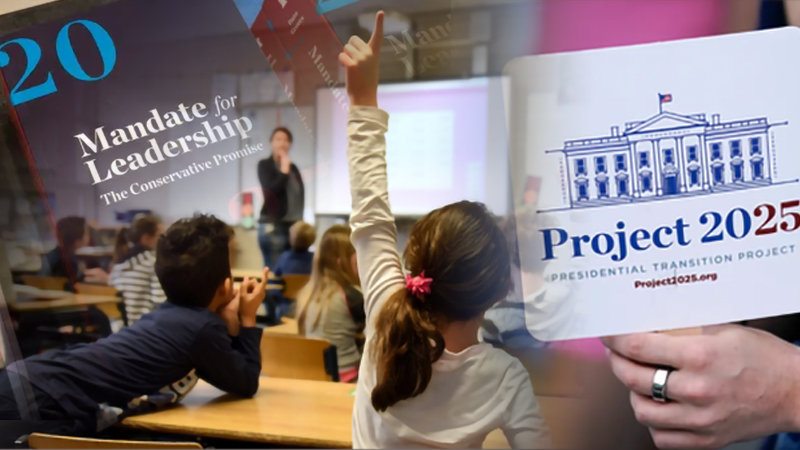
This article is part of First Focus on Children’s analysis of Project 2025, the granular policy agenda intended to serve as the “playbook” for a Republican presidential administration. This extremist agenda, along with the Republican candidate’s own words and platform, proposes measures that would leave America’s children poorer, sicker, and less likely to become productive citizens. Our series explores some of the most harmful proposals.
Project 2025, the self-described conservative “playbook” that will serve as the agenda for a Republican presidency, outlines a plan to “empower students and families” that, in reality, would shutter thousands of public schools, end supports for low-income students, divert taxpayer funds to the private education of wealthy students and, ultimately, destabilize public education altogether.
First Focus on Children has spent more than two decades working both sides of the aisle to protect and advance the needs of the nation’s children and students, nearly 90% of whom receive their education at public schools. The purpose of public education has always been to give the nation’s children the knowledge, skills, tools, and development they need to thrive as individuals and as citizens of our democracy. First Focus on Children works to secure strong federal oversight of education to ensure that all children — including those from low-income families, those with disabilities, those experiencing homelessness, English language learners, and other underserved student groups — have the same access to the resources they need to thrive, regardless of their family status, the state in which they live, or other disparities. In addition to serving the needs of students across diverse parts of the country, our federal education infrastructure also houses the Office for Civil Rights, making it the nexus of student protection. First Focus on Children supports data-driven policies for the nation’s public schools, including fully funding programs such as Title I and IDEA. First Focus on Children opposes diverting public funds to voucher programs, which move money to the pockets of wealthy individuals. Funding school privatization has depleted public education budgets across the country, making it harder for schools to effectively teach and serve all students. Yet this is exactly the path that Project 2025 would follow.
Universal Vouchers: A Disaster for Public Education, Students, and the Budget
Project 2025’s Mandate for Leadership offers a step-by-step plan to radically reduce support for public school children by transferring taxpayer dollars to private schools. The authors use a façade that claims to “empower families to choose among a diverse set of education outcomes.”
The education section of the Mandate reads as if it is designed to exacerbate inequities and make high-quality education and opportunity available exclusively to the wealthy. One of the agenda’s most alarming proposals advocates for giving all parents “the option to direct his or her child’s share of education funding through an education savings account (ESA).” Voucher schemes such as ESAs siphon money from public schools and funnel it to the private education industry. If Project 2025 is enacted, taxpayer dollars will be used to subsidize the private, oftentimes religious, education of wealthy students, at the expense of the nearly 90% of U.S. students who attend public schools.
It’s hard to overstate the destruction that this plan would inflict on the U.S. public education system. Directing each child’s education funding share to an ESA would rob public schools across the country of the funding they need to operate and would force tens of thousands of them to shut down or drastically reduce education services to children. This scenario has already played out in many states that have enacted school voucher and privatization schemes. Executed at the national level, these schemes would radically exacerbate existing inequities, cause extreme teacher shortages and layoffs, and create huge disparities in access to a quality education.
Imposing universal vouchers would also raise serious concerns about accountability. Private schools have no requirements for serving students with disabilities, are exempt from ensuring students meet grade-level academic requirements, and can reject students as they please, including for reasons such as their sexual orientation.
The lack of enforcement of curriculum standards for private schools and homeschool environments has allowed the existence of groups such as the “Nazi homeschool group,” where nearly 2,500 subscribers were given home school lesson plans and writing assignments based on the teachings of Adolf Hitler. Project 2025 would expand this lack of accountability and drastically reduce oversight of public schools.
In the education section, Project 2025 authors lay out their plan to “model” countrywide school choice initiatives on states like Arizona and Florida, where the expansion of vouchers has gutted accountability and encouraged deep levels of tax fraud. In Arizona, taxpayer-funded school vouchers have been used for ski passes, golf equipment, and lessons on how to drive a luxury car that cost more than $800 per session. In Florida, taxpayer dollars set aside for school vouchers have paid for kayaks and Disney tickets. Accountability has been virtually non-existent in these programs, allowing fraudulent use of vouchers at the expense of public school funding.
While Project 2025 frames universal vouchers as a cost-effective method, vouchers have consistently cost significantly more than projected and drained state budgets. For example, according to data from the National Coalition for Public Education, Arizona’s voucher program is estimated to cost 1,346% more than projected. For Florida, the cost of vouchers in the first year was 519% above projected costs. Voucher programs consistently cost significantly more than expected and create budget shortfalls. Creating a voucher scheme at the federal level would pose grave financial risk to taxpayers across the country. Public schools already struggle with inadequate funding, and it makes no sense to funnel public money to the private education industry.
In addition to its blatant decimation of public education and public budgets, the Project 2025 agenda also seems to willfully ignore the way taxes work and the purpose of federal education funding. Americans pay drastically different levels of taxes, which is one of the key reasons our public education system continues to struggle with high levels of inequity between high-income and low-income communities. Project 2025 is deeply unclear on how the formula would work across different income levels, stating only that parents can use their “child’s share” in whatever way they want. The so-called “share” for students attending underfunded public schools would be much smaller than the share enjoyed by students whose parents pay higher taxes and who attend schools with higher levels of funding. The proposed system also ignores the fact that federal education funding is largely designed to bridge inequities. The largest federal education streams, including Title I and IDEA, were created to ensure greater equity for students with disabilities and students in low-income families. The Project 2025 agenda is designed to do the exact opposite: Use government funds to create more inequity in education, especially for the most underserved students.
Eliminating The Department of Education: Wiping National Standards, Accountability Measures, Civil Rights Protections, and Education Experts from the Federal Government
A major premise of Project 2025 includes eliminating the Department of Education (DOE). The first sentence of the Mandate’s education section says: “Federal education policy should be limited and, ultimately, the federal Department of Education should be eliminated.” The authors justify DOE’s elimination by outlining the department programs that could be transferred to other agencies.
Getting rid of the Department of Education would eliminate the one-and-only federal department committed exclusively to children. Without a federal Department of Education, it would be impossible to confirm that all students across the country have access to a high-quality and equitable educational experience. The Department of Education also plays an essential role in enforcing federal statutes prohibiting discrimination and ensuring that the U.S. educational experience remains competitive globally. Transferring existing programs to various agencies would also require increasing staff and removing education oversight from seasoned staff and policy experts who are uniquely focused on the needs of children. Unfortunately, replacing career civil servants with political operatives is one of Project 2025’s overarching goals.
Removing all accountability from the U.S. education system is one of Project 2025’s stated goals. The authors boldly say, “To the extent that federal taxpayer dollars are used to fund education programs, those funds should be block granted to states without strings, eliminating the need for many federal and state bureaucrats.” This free federal money would allow states to provide radically different qualities of education and curricula, a trend already on the rise. In Louisiana, a new law requires schools to display the Ten Commandments in all classrooms. In Oklahoma, the state superintendent has directed all schools to begin teaching the Bible. Without federal accountability, this type of overreach would likely skyrocket.
The Department of Education plays an indispensable role in the educational achievement and experience of our nation’s children. The Department identifies major problems in education and informs Congress about new trends and research. It provides vital grants and funding for underserved student groups and enforces essential federal statutes. For example, the Department of Education houses the Office for Civil Rights and enforces federal civil rights laws that prohibit discrimination in programs or activities in schools that receive federal funding. Project 2025 would not only move the Office for Civil Rights to the Department of Justice, it would strip its enforcement authority, allowing it to “be able to enforce only through litigation.” Under this proposal, schools would have free rein to heavily discriminate against student groups and would only have to investigate the most serious of cases. The measure would pose a particular danger to the civil rights of students with disabilities, who continue to be subjected to harsh seclusion and restraint practices in some schools. With such limited federal oversight, students could be in danger of discrimination, including physical punishment, in the very environments that are supposed to be educating them.
